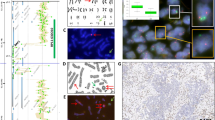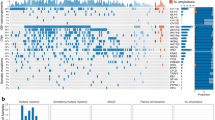Abstract
Deletions and rearrangements involving the long arm of chromosome 11 are not infrequent occurrences in the non-Hodgkin’s lymphomas. Recently, a tumor suppressor gene, the multiple endocrine neoplasia type 1 gene (MEN1) was cloned and mapped to chromosome 11q13. To assess the potential involvement of this gene in lymphomagenesis, we examined 94 primary cases of lymphoma and 12 cell lines by a combination of fluorescent in situ hybridization and PCR-SSCP analysis. In our initial analysis of 41 primary B or T lymphomas, MEN1 FISH analysis revealed allelic deletions in 15 cases (three of four B cell chronic lymphocytic leukemias, six of 15 follicular lymphomas, three of nine diffuse large B cell lymphomas, two of five mantle cell lymphomas, one of four Burkitt’s lymphoma). To discern whether the MEN1 gene was in fact the target of the deletions, we assessed 20 of these 41 cases and an additional 74 primary lymphomas and 12 cell lines for MEN1 gene mutations using PCR-SSCP analysis. Abnormal SSCP patterns were found in exon 2 in two of the primary lymphoma cases and in one of the cell lines, but not in any of the original cases that showed MEN1 deletions by FISH. Furthermore, sequencing analysis revealed that the abnormal SSCP patterns in exon 2 were the result of a previously described genetic polymorphism (S145S: AGC → ACT), and in one sample, the result of this S145S polymorphism associated with a second nucleotide substitution at position 498 which left the encoded amino acid unchanged. Our study indicates that the 11q13 locus is a frequent target of deletion in lymphoid neoplasms, but that there are no associated mutations of the MEN1 gene. This suggests that the 11q deletions either target another gene in lymphomas, or that the MEN1 gene is inactivated through means other than mutation.
This is a preview of subscription content, access via your institution
Access options
Subscribe to this journal
Receive 12 print issues and online access
$259.00 per year
only $21.58 per issue
Buy this article
- Purchase on Springer Link
- Instant access to full article PDF
Prices may be subject to local taxes which are calculated during checkout
Similar content being viewed by others
Author information
Authors and Affiliations
Rights and permissions
About this article
Cite this article
Thieblemont, C., Pack, S., Sakai, A. et al. Allelic loss of 11q13 as detected by MEN1-FISH is not associated with mutation of the MEN1 gene in lymphoid neoplasms. Leukemia 13, 85–91 (1999). https://doi.org/10.1038/sj.leu.2401216
Received:
Accepted:
Published:
Issue Date:
DOI: https://doi.org/10.1038/sj.leu.2401216



